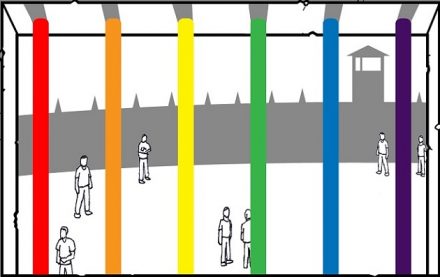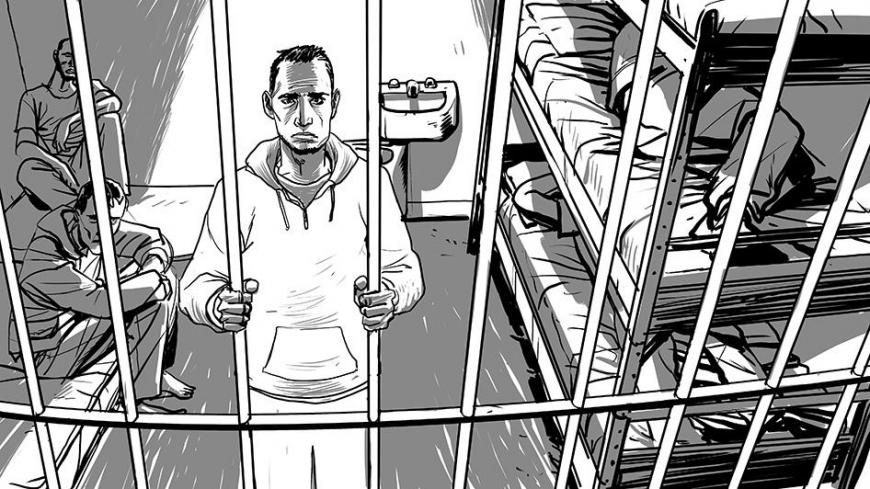Arbitrary detention of LGBTI individuals in Lebanon: specific vulnerabilities and international ways of recourse
– by AlKarama Foundation –

“States are complicit in the violence women and LGBT groups face if they implement discriminatory laws that trap these people in a spiral of abuse”, stated the United Nations Special Rapporteur on Torture (SRT) while presenting its report on the gender-perspective on torture to the Human Rights Council on 9 March 2016.
This draws interest to the role of the UN human rights mechanisms in tackling the issue of arbitrary detention of LGBTI individuals, individuals who are trying to break the silence surrounding such violations, particularly in the Arab world. Lebanon is no exception: singled out, arrested without reason, threatened and detained in poor conditions because of their sexual orientation, members of the LGBTI community are too often the hidden victims of arbitrary detention.
What is arbitrary detention?
To grasp what makes a detention arbitrary, it must be recalled that every person has the right to liberty and security, a right recognised by the Universal Declaration of Human Rights (UDHR), the International Covenant of Civil and Political Rights (ICCPR) – to which Lebanon is a party since 1972 – as well as Lebanon’s Constitution. Arbitrary detention constitutes a violation of this fundamental right.
International bodies monitoring the application of international human rights law, such as the Human Rights Committee (HRCtee), explain that, in order not to be arbitrary, detention must fulfil the following two conditions. First, the detention must be based on “lawful” grounds and carried out in accordance with procedures established by law. It is noteworthy that the concept of lawfulness does not only indicate that arrest and detention must be carried out in accordance with domestic law, but also with international law. For example, the detention of a Jordanian professor on the ground of “incitement against the regime” – a crime under Jordan’s law – for having merely criticised the government in a Facebook post can only be arbitrary, as it constitutes a punitive measure for having exercised his fundamental right to freedom of opinion and expression.

Arbitrary detention in Lebanon and LGBTI individuals: a double victimization
How are LGBTI individuals victims of arbitrary detention in Lebanon? LGTBI persons are detained both on unlawful grounds – among which these very “discriminatory laws that trap people in a spiral of abuse” –and in violation of their procedural rights.
First of all, article 534 of the Lebanese Penal Code states that “any sexual intercourse contrary to the order of nature is punishable to imprisonment for up to one year”. In addition to allowing for the prosecution of consensual homosexual relations between adults, this provision is also routinely applied to simply punish people’s sexual orientation.
Furthermore, despite international human rights standards requiring that an arrestee be brought promptly before a judge and the Lebanese Code of Criminal Procedure allowing for a maximum length of custody of 48 hours renewable once, the majority of persons suspected of having had “unnatural” sexual relations are kept in police custody for weeks.
Finally, LGBTI individuals also commonly subjected to anal and genital examination, which amount to torture or at least inhuman or degrading treatment. Already in 2009, these practices were declared illegal by the Order of Physicians and deemed scientifically useless to determine whether consensual sex had taken place. Moreover, LGBTI individuals are at further risk of being subjected to torture or inhuman or degrading treatment by ISF or police officers during the arrest and detention because of their sexual orientation.
These violations only add to other abuses generally suffered by all individuals in detention. For example, in the first half of 2016, 60% of the detainees were held in pre-trial detention, although pre-trial detention must be used as an “exceptional measure” and last a limited period of time as per international standards. Similarly, the right to have access to a lawyer or the own family are often curtailed, as some detainees even wait for weeks before being allowed to contact their relatives.
International human rights mechanisms have a say
Despite the fact that the issue of arbitrary detention of LGTBIs remains unspoken of in Lebanon, the United Nations human rights mechanisms have taken a clear stand in protecting and promoting the rights of LGBTI detainees in the country.
In a 2014 report, the United Nations Committee against Torture, a body of 10 independent experts that monitors the implementation of the Convention against Torture (CAT) – to which Lebanon is party since 2000 – recommended to prohibit anal searches or tests for men suspected of homosexuality.
Furthermore, during Lebanon’s last Universal Periodic Review (UPR) – an interactive discussion held at the Human Rights Council during which a State under review receives the recommendations of other UN Member States – several recommendations demanded that Lebanon protects the rights of LGBTI individuals and repeals article 534 of the Lebanese Penal Code. Lebanon merely “noted” these recommendations, hence refusing to commit to implement them.
In addition to these mechanisms which are already demanding Lebanon to ensure the protection of LGBTI rights, individual cases of violations can be submitted to the United Nations Working Group on Arbitrary Detention (WGAD), one of the UN “Special Procedures” – country and thematic experts appointed by the UN Human Rights Council (HRC) – mandated to look at arbitrary detention by conducting country visits, drafting reports, formulating deliberations on issues of general nature and investigating individual cases of violations.
This Working Group can receive and act upon communications referring individual cases and act on their behalf, issuing urgent appeals to request the government to ensure that the individual concerned will not suffer harm to his/her physical or mental integrity. The Group can also issue an Opinion qualifying a detention as “arbitrary” and calling upon the authorities to release the concerned individual. Already in 2003, this Working Group adopted an Opinion qualifying as arbitrary the detention of 55 individuals arrested and detained in Egypt on the grounds of their homosexuality, stating that their detention had a discriminatory character. This mechanism can therefore provide an avenue for Lebanese victims seeking redress.
Even though silence has continued to weigh on violations suffered by LGBTI individuals in detention for a long time, the growing concern of UN human rights mechanisms provides a window of opportunity for victims to raise their voice and seek redress at the international level. At the same time, if the Lebanese authorities are serious about upholding human rights, this is a crucial moment for them to abide by their international commitments and protect the inherent dignity of every human being, starting by repealing article 534 of the Lebanese Penal Code and ensuring LGBTI individuals are treated without discrimination and protected from abuses.



